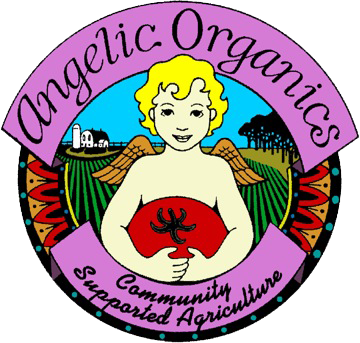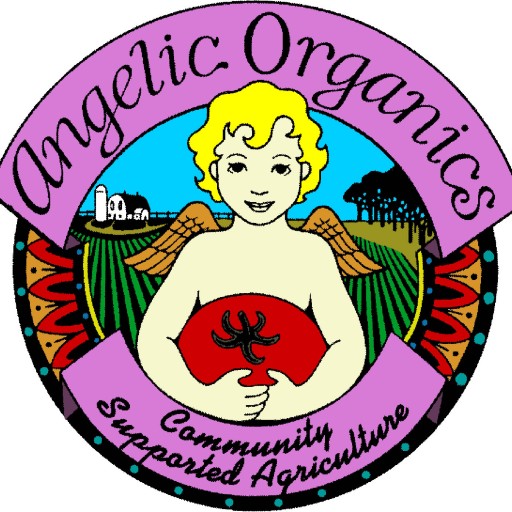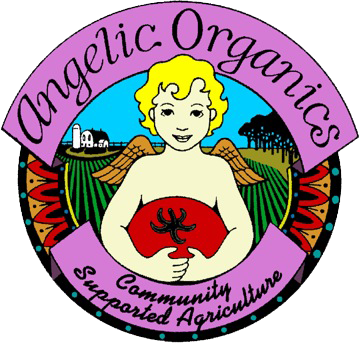No Dinner for Andy
The following essay by Farmer John is from Angelic Organics Farm News, Week 20, 1995
Cold November winds streak through the farm today. I look out on the land as it returns to its less differentiated state. There was once a sweep of great activity in these fields. Now they are brown rectangles of bare dirt or green swaths of oats and vetch. Crops once grew here in rows, stretched towards the sun, sprawled towards their neighbors, spiked, headed, unfurled, bulbed, spiraled, cascaded. There was heat, wind, cold, bugs, weeding, digging, tilling, walking, studying, planting, soothing, irrigating, lifting, shucking, clipping. And now this silence–the quiet fields echo the unmanifest, the undifferentiated.
We had an end of season farm party. We danced. We ate. We laughed. We said good-bye. I thought of endings, of fields reposing, of the space where Kimberly will no longer be, where Marci will no longer be, where Michelle will no longer be. I thought of fields reverting, ascending, to their unified state. There is a field where the thyme will no longer be, a field where the tomatoes will no longer be…
The next day, my friend Valdawn gave me a clock, a planting clock. It looks out from a foot and a half tall wooden case. One of its two faces gradually rotates through zodiac positions while specifying which vegetables should be planted during that celestial period.
During these last few days my watch started to lose power. Each day about 15 minutes just disappeared into…I don’t know where.
Time passes, surges, recedes, ascends. Maybe it does none of these. Maybe time just makes space. The good-byes and quieting fields and Valdawn’s gift of time made a space, a space in the past. I tumbled into it…
Darrel
During the mid-eighties–a very grim time for American farmers–I gave workshops on how rural people could help one another through the insolvencies that were sweeping farm country. In our community here in Boone County, many farms were being foreclosed, farms that had been in families for generations. Destitute farmers tended to not go to community functions, and other community members didn’t know what to say to them if they did show up. I knew that the upheaval in our community was felt deeply by the rural people, but the grief and sadness and support were not being fully expressed.
“What can I possibly say to my bankrupt neighbor?” people would helplessly ask one another. “I’m not a counselor.”
An exercise I conducted in my workshop was to have the participants close their eyes, and then visualize a person in their community who was suffering, someone they cared about. Then I asked the participants to imagine in a vivid way what they would like to say to that person. How would they go about it? Would they call? Send a card? Would they drive to their farm and knock on the door? What did the person look like when the imagined words were being spoken?
My mother participated in one of these workshops. I saw a great sadness in her face as she sat with her eyes closed, doing the exercise. Later, she told me she had been thinking of a neighbor, Darrel Edwards, whose family had been a friend of our family for three generations. The neighbor had farmed his whole life, was now in his sixties, was millions of dollars in debt, facing bankruptcy. His machinery was being repossessed. He and his wife didn’t go out in public any more.
“What did you imagine doing for Darrel?” I asked my mother.
“Inviting him and his wife over for dinner.”
“Are you going to do it?”
“It’s kind of awkward, because I never see them anymore. I guess I could just call them.”
“Are you going to call them?”
Mom paused. “Yes, I think I will.”
A week after the conference, Mom called. “Do you know that Darrel Edwards died this afternoon?”
“Died?”
“He died of a heart attack in his barn. I guess he just couldn’t take it anymore. I was going to invite them over for dinner on Friday.”
Andy
Isa lived here on the farm for five years–late 70’s, early 80’s. From here she moved to Manhattan, where she became the manager of EAT (If you want to get the feeling for what EAT is like, hear Woody Allen’s reference to it in the film Manhattan. Or just go there and have a light lunch for $75.)
Andy Warhol occasionally strolled into EAT. Andy liked Isa. He brought her signed copies of Interview magazine. He sent her flowers for her birthday. He brought her little wrapped presents. Isa was confused by this attention from the man who was famous for courting fame; Isa wasn’t famous. She was young, pretty, effervescent, rambunctious, creative. But she wasn’t Mick Jagger or the Queen of England.
Isa called me a couple times to announce that Andy was coming to Chicago to sign books or open a club. Once, I glued Isa’s baby pictures to an EAT shopping bag, filled it with popcorn and took it to Andy. The other time I wrote him a letter about farm life and presented it to him. Both times I saw Andy, he talked about Isa–her vivaciousness, her friendliness, the possibilities for her future. He did this in between signing pajamas and soup cans and books for admirers. After each Chicago visit he went into EAT the next day and told Isa he had visited with her farmer friend, and that we were picking pumpkins, or whatever I told him we were doing.
Isa was shy with Andy. One night she called me–this was in the mid-eighties. I was living in the log cabin in our woods.
“Andy wants to have dinner tomorrow night,” she said very softly. (Isa sort of whispered when she talked on the phone.)
“Great! Are you going to cook for him?” I asked.
“We’re going out. I don’t know what to say.”
“Say when?”
“At the dinner. I don’t know what to talk about.”
“Talk about anything you want. He’s really into you.”
“How do you know?”
“All he wants to talk about is you when I’ve seen him in Chicago. He’s fascinated with you.”
“No, he’s not. What should I talk about?” she whispered.
“Do you think he’s asking you out because he doesn’t like you, Isa?”
“What should I talk about?”
Tell him we’re harvesting our pumpkins,” I said confidently. “Tell him my mother is helping,” I added. “Tell him my mother is painting our barn, too, and she’s 74. Andy was really into his mother. He would love my mother.” (I had just finished reading for the second time his book From A to B and Back Again, so I was pretty confident that pumpkins and mothers were suitable conversation topics.)
I spoke with Isa a few weeks later.
“Did you tell Andy about our pumpkins?” I asked.
“I didn’t have to talk.”
“Why? Did he do all the talking?”
“There were 8 of us. I didn’t have to say anything.”
“Isa!” I chided.
“He’s coming over for dinner.”
To your place?”
“Yeah.”
“Just the two of you?”
“Probably his boyfriend, too.”
“When?”
“We didn’t set a date. I don’t know what to cook.”
“Isa, you know what to cook. Besides, he doesn’t care what you cook. He wants to hang out with you.”
“We’ll see,” she whispered.
Months passed. That winter, on a Saturday afternoon, a woman showed up at the farm with a t-shirt commemorating Edie Sedgwick. I studied Edie’s wan, stark image emblazoned on the shirt. Edie and Andy had been the darlings of the New York scene in the early 60’s. Edie died young. Andy continued on.
The next morning, a friend brought over an old album by the Velvet Underground– “the first punk band”, he said. “They were sponsored by Andy Warhol, or something like that.” I listened to the raucous, disjointed music on the seriously scratched album.
“I don’t get this music,” I finally commented.
“I think you had to be there,” my friend commented.
On the radio that afternoon, I heard that Andy Warhol was dead.
So this is why people are showing up with Andy Warhol paraphernalia, I thought. Andy is everywhere right now, even more so than when he was alive.
I called Isa.
“Are you okay, Isa?”
“Yeah, I just got back from cross-country skiing in the Catskills. It was beautiful.”
“You don’t know, then?”
“What?”
“About Andy?”
“What about him?”
How could Isa not know? I wondered. The whole world knows. How do I tell her? There is no way to lead into this, to build up to it.
“He died, Isa.”
“Died?” she gulped. “I was thinking about him in the mountains. Andy’s dead?”
“Yeah,” I said, clenching the phone, feeling such tenderness for Isa – Isa, the sweetest girl in the world, with the biggest heart, and that was why Andy had loved her so.
“Are you sure it’s not just some publicity stunt?”
I pictured Isa in her cute New York apartment, little shriney things all around, twinkly lights, everything beautiful and magenta. I imagined her scared look, her eyes pleading, darting about the room, looking for a happy way out of this sad news.
“It’s not a stunt.”
“I was planning what to cook. I figured it out when I was skiing.”
“He can’t come, Isa,” I said gently.
Long silence.
“I’m looking around the apartment now. Wherever I look, I see things Andy gave me.”
“I’m sorry you didn’t have your dinner, Isa. Andy would have liked it.”


